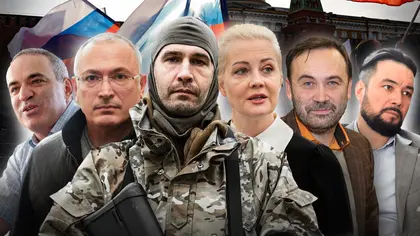With Putin’s election comes the opportunity to explore the varied ways that the Russian opposition approached it.
Yulia Navalnaya, who has been a more prominent voice for the Russian political opposition since her husband’s death, called on her countrymen to join in anti-Putin flash mob protests by forming long queues outside voting stations exactly at noon on March 17 – and then to vote for any candidate except Putin – or to spoil a ballot and write in “Navalny.”
JOIN US ON TELEGRAM
Follow our coverage of the war on the @Kyivpost_official.
But lining up a massive crowd outside of a polling station actually looks pretty good for you if you’re Putin and you want to show the world a nice photo of what massive “support” you’ve got.
This view was shared by others in the opposition who questioned Navalnaya’s approach.
On the same day that Navalnaya called for “Noon Against Putin,” various other Russian opposition leaders gathered in Kyiv, including Rostyslav Murzagulov, a businessman and activist, Mark Feygin, a well-known Russian YouTube blogger, Ilya Ponomarev, a former member of the Duma, and Ivan Tuytrin, co-founder of the Free Russia Forum platform – which frequently debates what a future Russia should look like after the ouster of the Putin regime.
Also present were leaders from the anti-Putin volunteer fighter brigades – the Freedom of Russia Legion (LSR), the Russian Volunteer Corps (RDK), and the Siberian Battalion – groups that have all taken up arms against the Kremlin, allying themselves with Kyiv.

Putin Promises to Ramp Up Production of Nuclear-Capable Ballistic Missiles Targeting Ukraine
In a signed memorandum, the participants called on their supporters to work politically, financially, and, importantly – militarily – to bring down the Putin regime.
While Navalnaya’s “Noon Against Putin” yielded no discernible result, the volunteer-fighters more direct approach – taking up arms directly against the Putin regime in the Belgorod and Kursk regions – has.
The anti-Kremlin fighters have reportedly won firefights against Russian troops, captured dozens of POWs, and are now attempting to negotiate power transitions with local authorities.
Their ultimate goal is to enter Moscow – along the way gaining more and more Russian popular support and bringing Russian Army soldiers who no longer wish to be a part of Putin’s meatgrinder over to their side.
“There is no other way, except toppling Putin’s regime militarily,” Ponomarev said.
In March 2014, Ponomarev was the only lawmaker to vote against the illegal annexation of Crimea. To escape the fate of so many Putin critics, he went into exile.
Now he and his companions are taking part in organizing guerilla warfare against Moscow, inviting Russians to join in the ranks of the Ukrainian Armed Forces – to fight for a free Russia.
And, along with wanting a democratic Russia, these fighters are supportive of Ukraine’s goals as well – the restoration of Ukraine’s full, 1991 borders, a Russo-Ukrainian peace treaty that would include an international tribunal for war criminals, as well as financial reparations to the victims of Russia’s genocidal actions in Ukraine.
The fragmentation of Russia’s opposition has traditionally played into the Kremlin’s hands. It has applied “divide and conquer” tactics for decades – often accompanied by brutal assassinations of opposition leaders.
For that reason, those who gathered in Kyiv called for closer collaboration with Russia’s liberal opposition – including that led by Mikhail Khodorkovsky, a Russian business magnate, and Navalny’s Anti-Corruption Foundation (FBK).
It remains to be seen how deep or what form that cooperation might take, as well as what Russia is going to look like when Putin’s reign of terror ends, but Ukraine can and should be a welcome place for anyone who wants to fight against Putin’s totalitarian regime and who respects Ukraine’s independence and territorial integrity.
You can also highlight the text and press Ctrl + Enter






